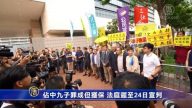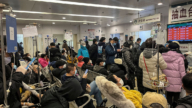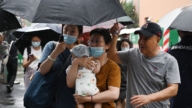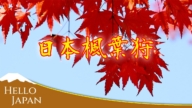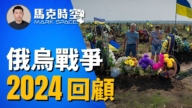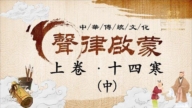【新唐人2014年11月14日讯】香港的占中行动在13号进入第47天,在行动走向暂时不明朗的情况下,中共党魁习近平还有美国总统奥巴马在前一天都分别就占中表示了他们各自的意见,引发外界的解读。而“占中三子”和香港学联对于下一步行动的决策,又是怎样呢?一起来看看下面的报导。
奥巴马和习近平12号在北京举行了联合记者招待会。尽管一开始的双方声明中并没有提到香港问题,但由于美国记者的提问,奥巴马谈到了敏感的占中运动。
奥巴马否认了中共媒体对美国在背后介入的指责。他说美国不会参与,因为这些问题最终是由香港人民和中国人民决定的。不过,奥巴马也重申了美国的看法。
美国总统奥巴马:“作为美国外交政策的内容,也是我们价值观的一部分,我们将继续提倡人民表达意见的权利,并且鼓励在香港举行的选举是透明的、公正的,并反映出当地人民的意愿。”
原《香港联合报》专栏作家张成觉:“奥巴马认为,美国并没有介入这个事情。从精神上来说,他是认为应该要倾听香港同胞的呼声,这一点是跟习近平不一样的。”
习近平之后也主动谈到了占中事件,他首次在公开场合说,占中行为是违法事件,北京支持港府的处置,并说香港事务纯属中国内政,外国不得干涉。
张成觉:“从北京的角度,或者说从习近平的角度,他认为‘公民抗命’本身好像就是违法了。但是,在香港或者是在民主社会,‘公民抗命’并不是那么大逆不道的行为。这一点上是因为双方的价值观,或者说是文化背景不同,这个没办法能说在一起了。”
除了再次显现美国和中共价值观的巨大差异,奥巴马和习近平谈占中,可能产生的影响更加受到外界关注。
香港《苹果日报》13号引用评论员刘锐绍的话说,习近平的这番话,可能“令危局更加危险”,或促使特区政府更加非理性、甚至暴力清场。
而香港立法会议员单仲偕认为,奥巴马表达的关注,对中共会有一定压力。
香港立法会议员单仲偕:“我相信虽然美国没有在公开场合给太大的压力给中方,但是中方也感受到国际社会对这个事情的关注,也不会做出一些太离谱的行为。”
目前,占中行动仍处在“退场”和“升级”之间的徘徊阶段,除了首脑的谈话,抗议人士的下一步决策,也将直接影响行动的走向。
香港《明报》说,“占中三子”有计划在本月21号自首,让公众明白占领并非无视法治。
“占中三子”自首的提议,出于戴耀廷一开始对和平占中的构思,其中有一条“承担罪责”,也就是行动结束后,参与者应自行向执法部门自首。
张成觉:“‘占中三子’要去自首,接受法律的裁决,那是一个有始有终,光明磊落的行为,应该肯定的。”
不过《明报》说,部分泛民及学联人士对自首的做法有保留,学联副秘书长岑敖晖说,他们认为目前占领仍是“公民抗命”,也愿负刑事责任,但近日传出清场消息,他们倾向接受警方拘捕,同时也会呼吁参加者的行动要符合“公民抗命”原则。
另一方面,学联仍然在考虑去北京,和中央官员对话的可能性。学联13号晚上和泛民立法会议员、学民思潮等团体再次开会,决定是否上京。
采访/陈汉 编辑/尚燕
Obama Urges Transparent Election in Hong Kong
Nov. 13 marks the 47th day of Occupy Central. While Communist Party leader Xi Jinping and U.S. President Barack Obama, both expressed differing views, the Occupy Central leaders also had their own ideas for their next moves. Let’s take a look.
In a joint conference in Beijing on Nov. 12, Barack Obama and Xi Jinping respectively delivered a brief statement. In the following Q&A session, a U.S. reporter’s question brought up the issue of Occupy Central.
Obama denied CCP’s accusations that the U.S. was meddling in the Occupy Central. He said that the United States had no involvement in fostering the protests that took place, and these are issues ultimately for the people of Hong Kong and China to decide. Obama also described the views of the United States.
U.S. President, Barack Obama: “The United States, as a matter of foreign policy, but also a matter of our values, we are going to consistently speak out on the right of people to express themselves and encourage that the elections that take place in Hong Kong are transparent and fair, and reflective of the opinions of people there."
Hong Kong writer Zhang Chengjue: “Obama does not believe the United States are meddling in things. Spiritually, he is different from Xi Jinping, believing that the voice of the Hong Kong compatriots should be heard."
In his Q&A session, Xi Jinping initiated the comment on Occupy Central. He said the Occupy Central is illegal, and Beijing firmly supports the SAR government’s decision. He again stressed that Hong Kong affairs are exclusively China’s internal affairs and foreign countries should not interfere.
Zhang Chengjue: “From Beijing or Xi Jinping’s point of view, civil disobedience is illegal. But, civil disobedience in Hong Kong or in a democratic society is not so outrageous. There is a difference in their values or cultural backgrounds."
Other than the huge different values between the U.S. and the CCP, the potential impact of Obama and Xi’s talks about the Occupy Central is more of a concern to the public.
Commentator Liu Ruishao indicated, Xi Jinping’s remarks could further worsen the situation and even procure irrational and violent clearing approaches of the SAR government.
The Hong Kong Legislative Council Sin Chung-kai believes Obama’s concern would exert certain pressure on the CCP.
Sin Chung-kai: “Although the United States has not publicly pressured China much, I believe CCP has sensed the concern of the international community and would not conduct any act that is too outrageous."
At present, the Occupy Central is in between “exit" and “upgrade". The next moves are also affected by the decisions of the protest leaders.
According to Hong Kong’s Ming Pao, the Occupy Central organizers are planning to surrender themselves on Nov. 21 to the police, demonstrating that the protest is not ignoring the rule of law.
The idea of surrender to the official was brought up by Occupy Central initiator Benny Tai. After the protest, the participants ought to surrender themselves to the law enforcement bodies.
Zhang Chengjue: “Accepting the legal judgment is a proper attitude to finish what one started and is a righteous form of conduct that should be recognized.”
Ming Pao also reported that some participants show reservations about the practice of surrender. Lester Shum, the deputy secretary-general of the Hong Kong Federation of Students, indicated that they are willing to bear the legal responsibility, but the recent rumor about “clearing sites" has them ready
to be arrested. They also called on participants to comply their actions with the principle of civil disobedience.
The Federation is still considering the possibility of dialogue in Beijing. On the evening of Nov. 13, the Federation will conduct a meeting with the Legislative Council of the Pan-Democratic Camp and the Scholarism about the Beijing trip.
Interview/ChenHan Edit/ShngYan


